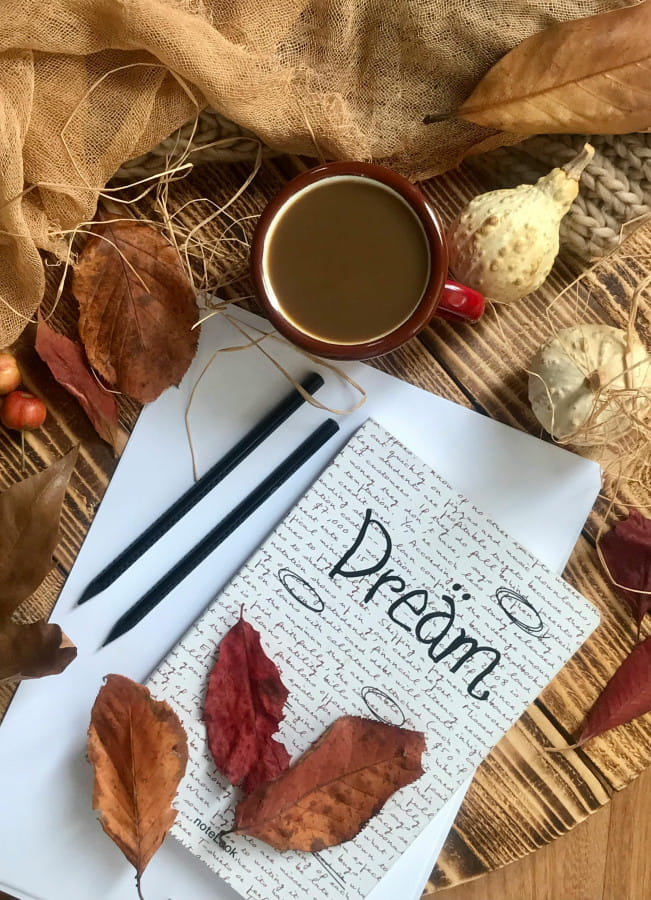Have you ever wondered why we dream and where they come from? Have you ever wondered what to do about the mad yet incredibly realistic dreams you sometimes have? Your dreams often fade away as quickly as you "see" them and the best way to keep track of everything you see in your dreams is by simply maintaining a dream journal.
What is a dream journal?
A dream journal is a simple way to keep a record or a personal note of your dreams by writing them down as soon as you wake up before they fade away from memory. It serves as a tool to help you understand your dreams over time, ultimately revealing a significant pattern or theme that emerges during your sleep.
It is also a common method for people intrigued by the concept of lucid dreaming (when you know you are dreaming while asleep) or those who try analysing their subconscious minds better.
Pretty fascinating, right? Once you get accustomed to keeping a dream journal, you will find yourself in surprising situations while writing down your experience.

The benefits/purpose of having one
Writing in a dream journal can help you better understand your emotions, improve coping skills, benefit mental health and can even improve sleep!
The details of one's dreams are often incredibly vivid but they begin to slip away within a few minutes right after one wakes up. So, if you fail to write them down, you will not end up remembering much of your dreams at all. Preserving the details, even by just scribbling or jotting some words down from the bigger images in your head will be very helpful for later reflection.
Similarly, if you are stressed out about something and you fully have not been able to acknowledge or process it in reality, you probably will dream it in the form of losing something, feeling trapped, or being chased.
This is an obvious sign to grasp that often you dream of whatever's in your subconscious mind. The subconscious mind is also another reason why you should be writing your dreams down as they usually work like an indicator pointing to areas where you are struggling emotionally in life. Hence, you can try allowing yourself to explore unprocessed feelings to gather more emotional insight that you have not yet by beginning to write a dream journal.
Furthermore, our dreams are often wild and strange with the most bizarre combinations or scenarios.
Some people like to use all that wildness and draw creativity out of it. If you are a writer, artist, musician, or any kind of creative person, having a dream journal could be great for deriving creative inspiration. If you want to read more into it, you will also learn about some famous artists and scientists who have credited their dreams for their inventions.
Last but not least, as impossible as it may sound, keeping a dream journal helps you realise and become aware that you are dreaming while in the dream, or, in other words, lucid dreaming.
Although it is something that improves your sense of control over your own dreams, lucid dreaming requires a lot of training, practice, and patience to track a difference or progress. In other words, lucid dreamers take time to reach the point where they fully trigger the lucidity of their dreams. Not only that, but these types of dreamers have a particular intention as to why they dive into their interests.
When you dream, recognising "dream signs" — things that appear in your dreams but would surely be strange in the real world — is one of the first steps to triggering your lucidity. For instance, if you constantly keep dreaming about the colour red whenever something important is about to happen, it's a sign of a sort. In easier terms, these repetitive signs or symbols are what you can track to understand when you are in a dream.
Every benefit you have read about so far is related to how consistent you become with writing a dream journal and how better you get at remembering your dreams. Something even more interesting that adds up to it is how over time your ability to recall and notice more details improves because you have done nothing but "train" your brain to pay attention to your dreams.
Reflect on the meanings of your dream, as understanding it can lead to self-discovery and help you understand your true self.
How to keep a dream journal and what to write about
Keeping a dream journal is quite simple. You can start by placing a diary on your bedside table so that when you wake up, you can immediately jot down whatever you remember. When you write things down, try focusing on the details of it more. Focus on describing the characters, signs, patterns, environments, emotions, and more with as much as possible. Sometimes make an effort to include your thoughts on the dream you are writing about. Most importantly, keep it consistent.
It will become easier for you to maintain a dream journal if you follow these simple tips —
It's always best to have an open mind and be non-judgemental when you write about a dream.
Do not think too much or worry about making a great piece of writing or the quality of it, just go with the flow and express.
If you are experimental with scribbling, sketching, or drawing here and there, it could help you convey the details and depths of your dream that words may not fully capture.








Comments